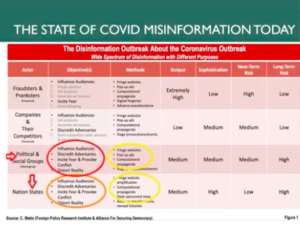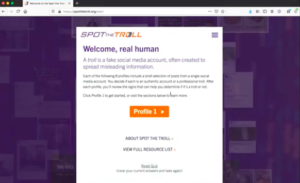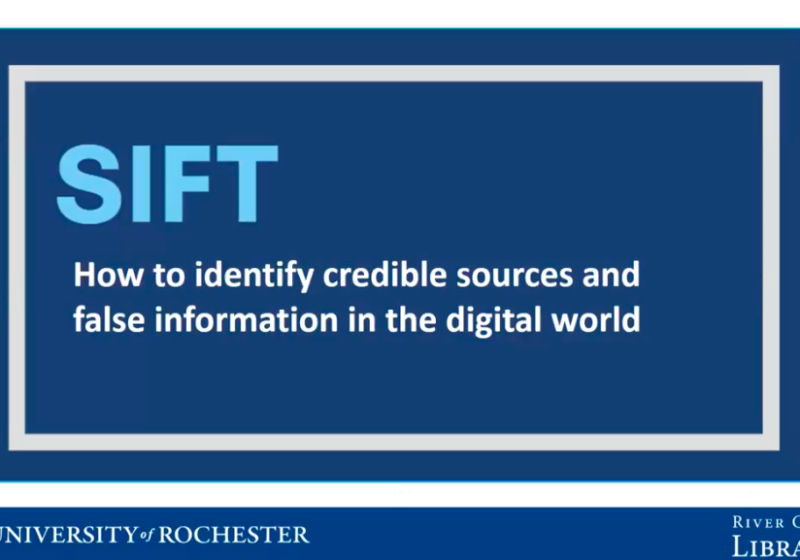Last Friday, the River Campus Libraries hosted a panel that explored the political manipulation and misinformation regarding COVID-19 news since the pandemic outbreak.
The event was organized and presented by several UR librarians and instructors: UR Social Science Librarian Stephanie Barrett, Business Librarian Robert Berkman, Director of Carlson Science & Engineering Libraries and Research Initiatives Sarah Pugachev, and Digital Media Studies Program Instructor Kristana Textor. The goal of the presentation was to equip participants with skills to identify misinformation and unreliable sources, especially regarding COVID-19 news.

One of the presentation slides showing the state of COVID misinformation today. Screenshot courtesy of Ashley Yoon.
The event kicked off with participants naming sources where they received their COVID-19 news and the panelists displaying an image published by the Foreign Policy Research Institute on the state of COVID-19 misinformation today.
“There is really no such thing as a source you can […] totally trust,” Berkman said — including ourselves.
“We’re also biased ourselves, we have our own values and worldview […] — and of course it’s good to have these, you don’t want to give them up,” he said. “But we don’t [necessarily want] our feelings to interfere with our ability to accept credible information, especially about health.”
Berkman explained how especially social media — among the least trustworthy news sources — biases its algorithm to show us posts that align with our already-expressed views, referring to this phenomenon as an “information bubble.” The key, he said, is to get out of the bubble.
“While our own internal biases can’t easily be avoided, it’s not correct to say that all media sources are equally credible and are equally successful in their attempt to be fair and informative,” Berkman said. “Some are more credible than others and that’s particularly true when it comes to news about science.”
So who should we trust? According to Berkman, you can trust a librarian.
“This is a source that has only one mission: […] to provide you with […] reliable, trusted, and credible information that is designed to just what you need,” he said.

A screenshot of the Spot-the-Troll game that was featured in the talk. Screenshot courtesy of Ashley Yoon.
The presentation then shifted to Textor and her activity Spot-the-Troll, a game created by Clemson University designed to help people better identify a fake media account.
Participants were able to vote whether or not the account shown was a troll — defined by Textor as “fake social media accounts used to spread misleading information” — through Zoom’s polling feature.
After the game, the panel shifted to Barrett’s presentation, who said that misinformation, disinformation, and mal-information related to COVID-19 “has become its own kind of pandemic” — or as many people call it, an “‘infodemic.’”
In an effort to fight this infodemic, Barrett introduced SIFT, a framework to identify credible and unreliable sources in the digital world. The method includes four steps: stop and take a moment, investigate the source, find better coverage and look into other more reliable sources, and trace back to the original source.
Though literacy in written articles is important, the same concept could be applied to data, according to Pugachev.
When looking at data, Pugachev said one should ask themselves what the source is, whether the data is clear and understandable, and what the context of the data is. Data regarding COVID specifically, however, is “messy,” often leading to misinformation.
“The problem […] is that with COVID[-19], the scientific process of learning, testing, revising is going on right in front of us,” Berkman said. “What appears to be wrong at any moment […] is really just watching the scientific process [unfold], and at some point, hopefully, we’ll get to that scientific consensus.”



